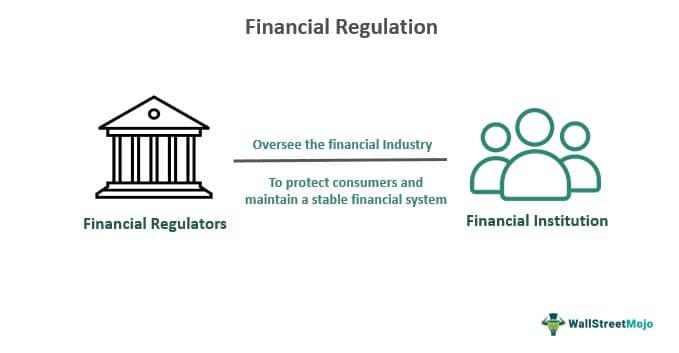Financial regulators play a crucial role in maintaining the stability and integrity of the financial system. Understanding the role of financial regulators is essential for individuals and businesses alike, as it directly affects how they navigate the complex world of finance. These regulators act as watchdogs, monitoring and overseeing financial institutions to ensure compliance with laws and regulations. By promoting transparency, protecting consumers, and mitigating risks, financial regulators contribute to a fair and secure financial environment. In this article, we will delve into the key aspects of understanding the role of financial regulators and shed light on their importance in safeguarding the financial well-being of society. Let’s dive in!
Understanding the Role of Financial Regulators
Financial regulators play a critical role in ensuring the stability and integrity of the financial system. They are responsible for overseeing and enforcing regulations that govern various financial institutions and markets. In this article, we will delve into the different aspects of understanding the role of financial regulators, including their objectives, functions, and the importance of their work.
Objectives of Financial Regulators
Financial regulators have several key objectives that guide their work. These objectives are aimed at promoting financial stability, safeguarding the interests of consumers, and maintaining the overall integrity of the financial system. Some of the main objectives of financial regulators include:
- Promoting stability: Financial regulators have the primary goal of ensuring the stability of the financial system. This involves monitoring and managing risks that could potentially lead to systemic crises.
- Protecting consumers: Financial regulators strive to protect the interests of consumers by ensuring fair and transparent practices in the financial industry. They develop and enforce rules that promote consumer confidence and trust.
- Preventing fraud and misconduct: Financial regulators work to prevent fraudulent activities and misconduct in the financial sector. They establish regulations and conduct investigations to identify and address instances of fraud and market manipulation.
- Facilitating market efficiency: Financial regulators aim to promote efficient and competitive markets. They monitor market activities, enforce rules that promote fair competition, and remove barriers to entry.
- Maintaining financial privacy and security: Financial regulators establish rules to protect the privacy and security of individuals’ financial information. They work to prevent data breaches and ensure that financial institutions handle customer data responsibly.
Functions of Financial Regulators
To fulfill their objectives, financial regulators perform a range of functions that are crucial for maintaining the stability and integrity of the financial system. These functions can vary across different jurisdictions, but some of the common functions include:
Rulemaking and Regulation
Financial regulators develop and enforce rules and regulations that govern the conduct of financial institutions, markets, and participants. These regulations cover a wide range of areas, including capital requirements, risk management, consumer protection, market transparency, and more. By setting clear guidelines, regulators create a framework that promotes stability and fairness within the financial industry.
Supervision and Monitoring
Financial regulators have the responsibility of supervising and monitoring financial institutions to ensure compliance with regulations. They conduct regular inspections, audits, and assessments to evaluate the financial health of institutions and assess their risk management practices. Through ongoing supervision, regulators can detect potential issues and take necessary actions to mitigate risks before they escalate.
Licensing and Registration
Financial regulators oversee the licensing and registration of financial institutions and professionals. They establish criteria and standards that entities must meet to obtain the necessary licenses or registrations to operate in the financial sector. This process helps ensure that only qualified and trustworthy entities are allowed to offer financial services.
Enforcement and Investigation
Financial regulators have the authority to enforce regulations and investigate potential violations. They have the power to impose penalties, fines, and other disciplinary measures to hold accountable those who breach the rules. Regulators also have the authority to collaborate with law enforcement agencies to investigate white-collar crimes and other financial offenses.
Education and Consumer Protection
Financial regulators play an important role in educating consumers about their rights and responsibilities in the financial marketplace. They provide resources, guidance, and educational initiatives to help individuals make informed financial decisions and protect themselves against fraudulent practices. Regulators also handle consumer complaints and disputes, ensuring that consumer rights are upheld.
The Importance of Financial Regulators
Financial regulators are essential for maintaining the stability, transparency, and fairness of the financial system. Their role is crucial for various reasons:
- Financial Stability: Financial regulators help prevent and manage risks that could destabilize the financial system. Through regulations and oversight, they work to ensure that financial institutions operate in a safe and sound manner.
- Investor Protection: Regulators aim to protect investors by ensuring that financial products and services are offered in a fair and transparent manner. They enforce rules that require disclosure of relevant information, reducing the likelihood of misleading or deceptive practices.
- Market Confidence: Financial regulators play a significant role in maintaining market confidence. When consumers and investors have trust in the financial system, it promotes healthy market participation and contributes to overall economic growth.
- Ethical Conduct: By establishing and enforcing ethical standards, financial regulators help foster a culture of integrity within the financial industry. This discourages fraudulent activities and unethical behaviors, protecting both consumers and the industry’s reputation.
- Consumer Empowerment: Through education and consumer protection initiatives, regulators empower individuals to make informed financial decisions. They provide resources that enhance financial literacy, helping consumers navigate the complex landscape of financial products and services.
In conclusion, financial regulators play a crucial role in ensuring the stability, integrity, and fairness of the financial system. By setting regulations, supervising institutions, and enforcing compliance, they promote financial stability, protect consumers, and maintain market confidence. Their work is essential for fostering a healthy and trustworthy financial environment.
The role of financial regulation
Frequently Asked Questions
Frequently Asked Questions (FAQs)
What is the role of financial regulators?
Financial regulators have the responsibility of overseeing and regulating the activities of financial institutions and markets. They ensure compliance with laws and regulations, protect consumers, and promote stability and efficiency in the financial system.
Why do we need financial regulators?
Financial regulators play a crucial role in maintaining the integrity and stability of the financial system. Their presence ensures fair practices, reduces the risk of fraud and misconduct, and protects the interests of consumers and investors.
What are the main objectives of financial regulators?
Financial regulators aim to achieve several objectives, including maintaining financial stability, protecting consumers and investors, promoting fair competition, preventing financial crimes, and fostering innovation in the financial sector.
How do financial regulators promote financial stability?
Financial regulators promote financial stability by monitoring and assessing risks in the financial system, enforcing regulations to mitigate those risks, and implementing measures to prevent crises. They also coordinate with other regulatory bodies and central banks to address systemic issues.
What powers do financial regulators have?
Financial regulators are typically granted powers to supervise and examine financial institutions, enforce compliance with regulations, impose penalties for violations, and revoke licenses when necessary. They also have the authority to propose and implement new regulations and guidelines.
How do financial regulators protect consumers?
Financial regulators protect consumers by ensuring that financial products and services are fair, transparent, and not misleading. They enforce regulations on disclosure requirements, handle consumer complaints, and take action against entities engaged in deceptive or fraudulent practices.
What is the role of financial regulators in preventing financial crimes?
Financial regulators play a vital role in combating financial crimes such as money laundering, terrorist financing, and fraud. They establish anti-money laundering and counter-terrorist financing regulations, monitor suspicious transactions, and work closely with law enforcement agencies to investigate and prosecute offenders.
How do financial regulators foster innovation in the financial sector?
Financial regulators recognize the importance of technological advancements and innovation in the financial sector. They create regulatory sandboxes, encourage fintech startups, and develop frameworks that balance innovation with consumer protection. By doing so, they promote competition and drive the development of new and improved financial products and services.
Final Thoughts
Understanding the role of financial regulators is crucial for ensuring the stability and integrity of financial markets. These regulators are responsible for enforcing regulations and overseeing the activities of financial institutions to protect consumers and maintain market transparency. By supervising and monitoring market participants, they strive to prevent fraudulent activities, promote fair practices, and mitigate systemic risks. Furthermore, financial regulators play a vital role in promoting investor confidence and maintaining the overall health of the economy. Their efforts contribute to the smooth functioning of the financial system, which ultimately benefits individuals and businesses alike. Understanding the role of financial regulators is essential for all stakeholders involved in the financial sector.



